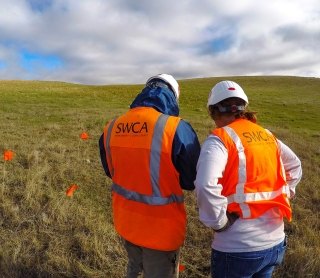Environmental inspection is a fluid and dynamic sector of the energy development landscape. For construction of pipelines, transmission lines, or other linear projects, a highly qualified environmental inspector who can ensure regulatory compliance is essential for keeping your project on schedule and within budget.
Environmental inspection is driven by many factors, such as the need for companies to comply with environmental regulations, maintain public and agency goodwill, and meet tight deadlines to bring energy to market profitably when windows of opportunity are open. An environmental inspector is usually required for projects constructed on federal land.
What does an environmental inspector do?
- provide inspection assessments at the inception of a project
- conduct environmental monitoring, electronic reporting, and adaptive management during construction to meet federal, state, and local laws and regulations
- act as liaison between the contractor (construction field staff), project developer, and regulatory agency staff
- conduct environmental training, construction meetings, and tailgate sessions
- coordinate mobilization of resource monitors (biological, cultural, and paleo) to specific areas
- ensure work remains within delineated work areas and outside of sensitive resources areas
- prepare Storm Water Pollution Prevention Plan Inspection Reports
- coordinate with craft and utility inspectors to ensure environmental issues are addressed with their respective activities
- work with construction foremen and superintendents to look ahead of construction to anticipate potential issues before they escalate or have the potential to cause schedule impacts
- ensure compliance with topsoil salvage requirements, dust control measures, spill prevention and countermeasure plans, water quality requirements, sensitive resource protection measures, and other project-specific measures
- provide on-the-fly planning, delineations, field-staking, and workarounds
- help prepare, process, document, and obtain variance requests
- resolve compliance issues in a timely manner
- monitor and document reclamation and habitat restoration efforts, including application of the correct seed mix and mulch per project specifications
- coordinate water sampling (lab analysis) of hydrostatic test discharges
What should you look for in an environmental inspector?
An effective inspector will:
- have a solid understanding of the facility construction process and knowledge of the potential compliance issues that can arise during each phase of construction
- be knowledgeable about the federal and state regulatory processes in the state(s) in which the project is located
- take the time prior to construction to become familiar with the project’s permits, plans, safety standards, and mitigation requirements
- once construction begins, be capable of supervising the delineation of work areas, flagging and fencing of sensitive resource/exclusion areas, and installation and maintenance of stormwater best management practces and erosion control devices
- have a high degree of technical savvy in GPS data collection, use of electronic reporting systems, and other technological tools in the field
- ideally, have a diverse background in areas such as water body and wetland delineations, endangered species, cultural resources, hydrology, and landscape ecology
- demonstrate good common sense, understand his or her role on a project, follow the proper chain of command, be able to relate to a wide range of personalities, have good conflict resolution skills, and, perhaps most importantly, be a good communicator
What should you look for in a firm that provides environmental inspection services?
Equally crucial to hiring a qualified individual inspector is selecting a firm that offers the right support services and systems for your project needs. You want to look for a firm with experience and the ability to be involved at each stage of the project life cycle for your particular area of development. Ideally an inspection firm will offer environmental services beyond inspection and resource monitoring during construction. The ability to provide multiple services under one roof — everything from creating comprehensive compliance management programs to expertise in endangered species, air and water quality, streams and wetlands, cultural and paleontological resources, planning, and GIS services — can increase permitting efficiency. Having one contact list and one chain of command for inspection-related services saves you the time and expense of coordinating inspectors and monitors from multiple consultant teams.
Unanticipated field conditions often demand rapid communication and sound decision-making to ensure compliance and minimize resource impacts. When an inspector discovers issues in the field, an electronic reporting capability that gives you real-time access to data in a secure web-based format can help you resolve those issues quickly enough to prevent project delays. Strategic thinking and responsiveness are required on the part of the inspector and the firm he or she works for. And a firm’s good reputation and strong working relationships with federal, state, and local agency staff can mean fewer complications when regulatory personnel are onsite.
Finally, you’ll want to look for a firm that takes safety seriously and rigorously trains its inspectors in OSHA guidelines and other safety protocols for the construction industry. A firm with a robust safety program is better equipped to ensure your project adheres to OSHA requirements and applicable state-level safety regulations.
